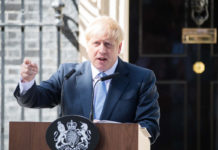
The SLTA fought changes to drink drive limit every step of the way – and often alone, writes chief executive Paul Waterson
IN the late 1970s I attended my first ever alcohol conference in Glasgow.
I can’t recall exactly who the main speakers were or much of the detail about their presentations, only that I listened intently as they eloquently put forward the case on how to combat the problems associated with alcohol abuse in our country.
What I do remember clearly was talking to a very interesting gentleman at the end of the day. It was to be my first encounter with someone who was totally anti-alcohol.
We talked for quite a while and I listened closely to what he said, especially about the liberalisation of licensing laws under the 1976 Act and how that would bring about even more alcohol-related problems.
I asked what his group wanted to achieve. He told me that by the year 2000 they wanted per head of population intake of alcohol to drop to a level that was close to prohibition levels.
Incredulous, I asked how they could possibly achieve that. He replied: by using the drink driving limits.
In the 1960s when drink driving laws were introduced the level was set at 80 milligrams of alcohol for every 100 millilitres of blood. He believed that by intense lobbying of politicians and others the limit would be dropped to 50mgs by the late 1980s and 20mgs by 2000. “It’s the best weapon we have,” he told me. “Eventually the moral argument will trump the business one.”
Prophetic words.
This conversation has stuck with me ever since. And although his timescale proved to be a bit optimistic, he wasn’t far away. For many years I have told that story and warned anyone who would listen of the catastrophic effect a lowering of the drink driving limit would have on our businesses.
Every time MPs at Westminster hinted on a change, which happened regularly over the years, we spoke up against it.
We took every opportunity to fight the change; and nearly always on our own. The industry quite simply would not help, worried that they would be seen as somehow condoning drinking and driving.
Personally I took a lot of criticism, and the argument against our position very often got fraught and emotional. One particular headline I laughed at was: “lunatic pub boss fights to keep drink drivers safe”.
But it also could be very difficult. On one televised debate I was confronted by a lady who lost her child when the car she was driving collided with one driven by someone three times over the limit.
However my encounter at that first alcohol conference made me believe that we had to fight this no matter how difficult; and, I stress, not because of the difference it makes in stopping people driving over 50mgs but because it’s anti-alcohol and anti-pub.
Uniquely, this measure attacks moderate drinking. What other regulation stops people having a glass of wine before driving home after work, stops people having a few drinks on a Friday night because they are driving early the next day?
The great fear of being prosecuted for having tiny residual amounts of alcohol in the blood stream long after a night out stops people drinking moderate amounts.
I am not going into the arguments for and against – it’s too late for that. The reason I say all this is because we now have the 50mg limit and the negative results for our trade have been well-reported – in SLTN (January 8) and subsequently in the mainstream media.
However I was really surprised when one major Scottish operator blamed the SLTA for not doing enough to stop this; needless to say they have never, like many of you reading this, been an SLTA member. Perhaps if they, and many of you, had been, we would have had the resources to fight this battle.
I have heard it said that this was put through the Scottish Parliament quickly. Yes, it was.
But how many of you responded to the government consultation? We did. How many of you met your MSPs and talked to them about your concerns? How many of you gave us the power of your membership to try and turn about a situation which will change drinking habits, slash consumption levels and see pub closures and job losses?
To our members, I thank them for their continuing support. There will be more significant battles to be fought, and the SLTA will do its best with extremely limited resources to win those battles – but we need your help.
• Paul Waterson is the chief executive of the Scottish Licensed Trade Association.























